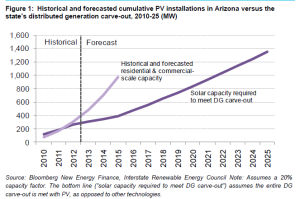by MATTHEW PHILIPS for Businessweek, Mashable, November 24, 2013

Historical and forecasted cumulative PV installations in Arizona versus the state’s distributed generation carve-outm, 2010-2025 (MW)
Image source: www.mashable.com
Last week, Arizona regulators gave the state’s largest utility, Arizona Public Service, the authority to charge homeowners with solar panels on their roofs a fee for plugging into the grid and in some cases, selling electricity back onto it. Beginning next year, homeowners who install rooftop solar systems will have to pay a monthly levy — the first ever in the U.S. — equal to $0.70 per kilowatt of installed capacity.
That’s well below the $8 per kw that APS had initially sought. Depending on how big their home system is, the fee will end up costing consumers anywhere from $3 to $6 a month, according to a report by Bloomberg New Energy Finance. APS had hoped to be able to charge about $50 a month per home. The 18,000 rooftop solar systems already present in APS’s service territory will be grandfathered; only those installed after Dec. 31 will be subject to the levy.
“This is a body blow for the Arizona solar industry, not a knockout punch,” says Stefan Linder, an analyst with Bloomberg New Energy Finance. “While this fixed fee will cut into the economics of residential solar, for many homeowners it will still make financial sense to go solar.”
The Solar Energy Industries Association claims that a typical rooftop solar system saves a homeowner about $5 to $10 per month; other estimates put it closer to $20.
The decision by the Arizona Corporation Commission is the first stab at resolving a contentious fight that’s been brewing for years between the solar industry and public utilities. Arizona, the second-largest solar market in the U.S., behind California, has been viewed as a critical battleground in deciding whether utilities would be able to squeeze money out of homeowners who no longer buy electricity from them — and in many cases, actually get paid for pushing supplemental power generated by their solar panels back onto the grid.
This is how we got here: In 2007, regulations in Arizona took effect that required power suppliers to be getting 15% of their power from renewable sources by 2025. Included in the regulations was a “carve-out” that required 30% of that clean energy to come from so-called distributed generation, rather than large centralized plants. To comply, APS began paying people cash to install rooftop systems on their homes. For every watt of capacity they installed, APS paid them $3. It also instituted a net-metering system in which customers were credited for the retail value of the electricity their solar panels fed back onto APS’s grid.
The incentives worked almost too well. The number of rooftop solar systems in APS’s service territory exploded, from 900 in January 2009 to 19,000 in June 2013, far exceeding estimates and even surpassing what was required to comply with the carve-out. APS cut its cash payments from $3 to just $0.10 a watt.
It’s hard to say exactly who won here. To listen to each side, you’d think they both lost. APS chairman Don Brandt said in a statement that the decision “falls well short of protecting the interests of the one million residential customers who do not have solar panels.” APS argues that customers with solar systems are getting a free ride by having access to the grid, but not contributing the revenue needed to maintain it. Those costs, public utilities hold, will be unfairly borne by homes without solar panels.
Of course, the solar industry wanted no fee. Though most analysts tend to see the decision as a narrow win for the solar industry, one that leaves intact the general economics of rooftop solar, anything above a zero tax was going to be spun as a catastrophe by the solar industry. The SEIA put out a statement saying it was “deeply-troubled by this precedent setting action.”
The fight will now move to other states. At least five others are considering taxing rooftop solar systems. Though after Monday, the solar industry has one-less state to worry about. This week, Georgia Power withdrew a proposal that included assessing a tariff on homeowners with rooftop solar systems.